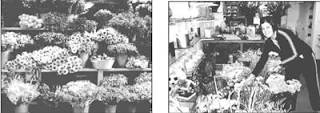A. Look at the pictures and lay what yon see in them.
B. Work in pairs. Choose a job from the box below but don’t tell your partner. Ask and answer the following Yes/No questions to find out what the job is.
Architect, taxi driver, dentist, farmer, lawyer, photographer, accountant, mechanic, soldier, hairdresser, chef; politician, nurec, plumber, florist
Use these questions to help you.
Do yon...7
|
Do you have to...?
|
Did you have to...?
|
work inside
|
wear a uniform
|
study at college
|
earn a lot
|
work in shifts
|
do a lot of training
|
work with people
|
use your hands
|
do internship
|
use a computer
|
get up early
|
|
Speak Rnglish
|
C. Read the text and answer the following questions.
Have you ever thought of a very creative career? Have you dreamt of a rosy environment full of colour and fragrance? How much would you love it if you were placed in a store foil of flowers the whole day? Pm just going to give you some clues about such a job which can also be a business.
Yes. Daisies, violets, tulips, marigolds, dahlias, lilies, jasmines, roses and all those things of beauty can also earn you a living if you handle them professionally. If you start such a profession you will be called a florist. A florist's career is a good choice as an unconventional job for many around the world. Wherever you see eye-catching floral displays, you actually see the professional performance of a floral designer.
Using both real and artificial flowers with other greeneries, florists prepare flower displays for a variety of events such as weddings, birthdays, anniversaries, Valentine's day, official receptions and even funerals. Every flower comes with its distinct colour, design, value and meaning which flower designers have to know well. There are conventions and meanings associated with flowers. We know that conventionally roses are meant for romance and marriage anniversaries and tulips for birthdays.
Although formal education or a diploma is not always essential for florists, they must have good taste, a good eye for colours, shapes and proportion. They have to have good sense for selecting flowers, ribbons and other accessories to make beautiful arrangements. Professional florists are knowledgeable about not only flowers but also designs and techniques. Most florists learn the trade mainly through apprenticeship in a flower farming job and also by attending formal floral schools and courses. However, a true passion for flowers and a bit of aesthetic sense are all that can make a florist's career successful.
Flower designers earn fairly handsome money. But the bonus is that they work in a fresh and beautiful environment which their clients also enjoy. They work with flowers all day long in a pleasant and fragrant atmosphere with vivid colours around. But there is a disadvantage too, if you are inclined to see so: florists deal with flowers, but miss their honey!
Questions
1 How is the career of a florist?
2 What qualities do you need to have for a florist's job?
3 How do most florists learn the trade?
4 What is the extra advantage of a florist's job?
D. Suppose you have met a florist in a flower shop. Write an imaginary interview with him/her.
E. Write a short paragraph giving reasons why you like or don't like the job of a florist.
If you want read the next unit please click the link below:
Unit Ten: Dreams
If you want read the next unit please click the link below:
Unit Ten: Dreams






0 Comments:
Post a Comment